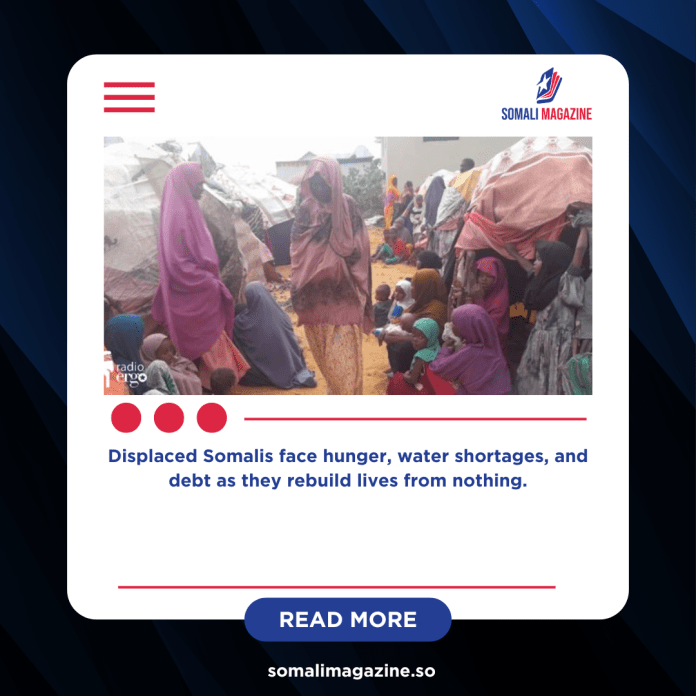Facebook Twitter (X) Instagram Somali Magazine - People's Magazine
Hundreds of families from Somalia’s Lower Shabelle region have fled to Mogadishu after clashes between government forces and Al Shabaab forced them from their homes. Now living in displacement camps, many are facing hunger, thirst, and the harsh reality of starting from nothing.
Among them is Muno Sheikh Abdisalan, who is seven months pregnant and caring for five children. She says her family often goes without food, sometimes surviving on only water. “If we get food once a day, we thank God. But sometimes even that is not possible,” she said. Their shelter is made of worn cloth and tree branches, leaving her children exposed to the cold nights. They sleep on the bare ground, their skin covered with sores.
Before the fighting, Muno and her family lived in Mubarak district in a three-room home, supported by three hectares of farmland and 37 goats and cows. But when clashes broke out earlier this year, they were forced to abandon everything, including crops that were almost ready to harvest. They lost about $300 worth of seeds they had planted, and later, when her husband returned to check, he found that all their animals had died.
Life in the camp has brought new struggles. Water is expensive, costing a dollar per jerrycan, far beyond what they can afford. Sometimes the camp leader helps them get water, but it is never enough. Their journey to Mogadishu was also harsh—they walked more than 50 kilometers without food or water, hoping that safety in the city would mean relief. Instead, they found only more hardship.
Another mother, Hindiya Abdi Ibrahim, faces similar challenges. She fled Mararey with her five children and now works odd cleaning jobs in Mogadishu. In a good week, she earns just $3, enough to buy a little food and water. On days when she finds no work, she borrows from shops near the camp. But her debts have piled up to $50, and shopkeepers have warned they will not extend more credit unless she repays. Two of her children were forced to stop attending Koranic school because she cannot afford the $6 monthly fee.
Back home, Hindiya had planted maize, pumpkin, cucumber, carrots, and lemons on her 2.5-hectare farm. She borrowed $400 for seeds, hoping to repay the loan after harvest. But the fighting forced her to leave before the crops matured. “The stress of that debt is unbearable,” she said. “I only pray to God not to die before I pay it back.”
Mohamed Abdi Abdullahi, 45, also lost everything. He and his wife, along with their 13 children, arrived in Mogadishu after fleeing Awdhigle. Their home, farmland, and belongings were all destroyed in the conflict. As a lifelong farmer, Mohamed has no other skills to survive in the city. His wife has been sick for months, but he cannot afford medical treatment. He said he feels hopeless about returning, but wishes for at least one thing: that his children can go to school and have a chance at a better future.
The conflict in Lower Shabelle has forced many families like Muno’s, Hindiya’s, and Mohamed’s into miserable conditions. Most of them had once relied on their farms and livestock for survival, but now they live in camps where jobs, food, clean water, and healthcare are scarce. With drought and ongoing fighting expected to worsen, aid workers warn that Mogadishu’s camps will see even more displaced families arriving in the coming months, bringing with them the same stories of loss and hardship.

